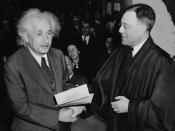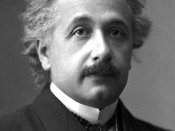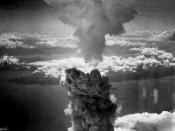Very Good peice of work Excellent
Albert Einstein
1879-1955
Einstein was undoubtedly the single greatest contributor to science in the 20th century. Few will argue with that point. His gifts to today's understanding of the universe, energy, time among others base many branches of modern science.
His contributions are not restricted only to the fields of science, but also to the individual person: from powerful heads of states to the average citizen. Albert Einstein helped Oppenheimer1 develop the fundamental science needed to break atoms, causing massive amounts of energy to be released. There are two common forms of this technology today, the Nuclear Power Plants, and the Atomic, or Nuclear Bomb.
During the WWII battles with Japan, the United States government instructed a group of scientists to derive a new weapon, one that could potentially cause large scale destruction emitting from a single bomb. Many notable scientists contributed to this project, but none with as much global respect as Einstein.
With the help of his physics knowledge, the mission was accomplished: a weapon yielding the force of thousands of tons of dynamite was tested at a government installation test site in Nevada.
Soon after the United States used this weapon on Japan twice, The Soviet Union developed their own nuclear weapon. The Arms Race was on. Suddenly both countries expended large amounts of resources on making these bombs useful in combat. Three hundred billion U.S. dollars2 were spent to ignite this project and produce only a small number of functional bombs. The Soviet Union was thought to have spent about equal amounts.
By the late 1950's what we now know as the Cold War erupted. Nuclear Holocaust seemed inevitable. Tensions between the Communists and the States reached monumental highs. The whole United States suddenly went into a panic mode...


